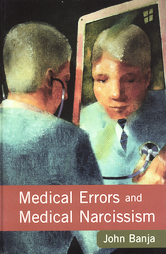Medical Errors and Medical Narcissism
 John Banja, assistant director of health science ethics at the Center for Ethics and associate professor of rehabilitation medicine, is perhaps the easiest interview on campus. An expert on medical ethics and author or co-author of more than 150 publications, his latest book is Medical Errors and Medical Narcissism (Jones and Bartlett, 2005).
John Banja, assistant director of health science ethics at the Center for Ethics and associate professor of rehabilitation medicine, is perhaps the easiest interview on campus. An expert on medical ethics and author or co-author of more than 150 publications, his latest book is Medical Errors and Medical Narcissism (Jones and Bartlett, 2005).The innovative book is an exploration of the legal, psychological and ethical effects of medical errors on patients and their health care providers. In Banja’s view, error disclosure to patients can be compromised by health professionals’ need to preserve their self-esteem (“medical narcissism”).
Emory Report sought to discuss this point of view with Banja, but upon arrival he decided instead to interview himself. Narcissistically.
BanjaQ: With a title like Medical Errors and Medical Narcissism, do you think any doctors will read the book?
BanjaA: Well, some will be turned off by the title. But I tried it out on dozens of physicians, and I was heartened by a fairly consistent reaction: Their eyebrows ascended, and they said, “Interesting …” A few looked at me crossly, though, and said, “What’s your evidence?”
BanjaQ: That’s a good question. What is your evidence? In fact, are you claiming physicians are pathological narcissists?
BanjaA: No, I’m not saying that and I remind the reader repeatedly that I am not making that claim. What I’m saying is that medical training—in fact, health care training in general—has lots of narcissistic traps or temptations for trainees.
BanjaQ: Like what?
BanjaA: Well, look at the “perfectionist” model that so many physicians were and sometimes still are trained in. Their supervising physicians expect them to be errorless; their patients expect them to be perfect. It’s easy for physicians to buy into the perfection myth, so it’s no wonder that physicians tend to be compulsive.
BanjaQ: So do perfectionist doctors have trouble managing medical errors?
BanjaA: That’s part of the idea. A bigger part, however, is that most health professionals (in fact, most professionals of any ilk) work on cultivating a self that exudes authority, control, knowledge, competence and respectability. It’s the narcissist in us all—we dread appearing stupid or incompetent. The problem, I think, is that health care is so unpredictable and stressful and contains such high stakes, that many practitioners exaggerate their competence. They come to believe that one ought never appear ignorant, uncertain, hesitant or wrong. So when this professional self-image is challenged, these persons are tempted to withdraw, or become hyper-defensive or just plain arrogant.
BanjaQ: Again, where’s the evidence for this?
BanjaA: Probably the best evidence is in the form of thousands of people who suspected they or a loved one was grievously harmed by error, but who never had their questions adequately answered by the health professionals treating them. Instead, these people asked a lawyer to find out what happened. But maybe the most interesting thing I stumbled across in my research was the way health professionals rationalize their medical errors.
BanjaQ: Rationalize?
BanjaA: Yes. Remember that calling X an “error” is essentially an interpretation. Now, when your self-interest is at stake—such as in not getting sued for medical malpractice—it’s amazing how ingenious one can become in “re-interpreting” what happened. An error might become an “incident”; or we decide we don’t have enough evidence to say absolutely that an error caused the patient’s harm; or we decide that maybe an error did cause the patient harm, but that the harm wasn’t so bad; or that the catastrophe that happened “wasn’t my fault.” Maybe we decide it wasn’t anyone’s fault.
BanjaQ: So these are ways the health professional tries to protect him or herself from the emotional pain of owning up to the error and his or her obligation to disclose it?
BanjaA: Right, and that’s what I call “medical narcissism.” I’m not saying all health care professionals are imperious or arrogant—although a small minority certainly are. Every profession boasts a minority of obnoxious, overbearing narcissists. What I am saying is that there is an atmosphere in health care that can breed narcissistic inclinations and attitudes that make it very difficult to disclose medical errors truthfully and ethically. And encouraging that atmosphere are the malpractice carriers and hospital lawyers who have long insisted that health professionals not admit liability—in other words, not admit error or apologize for it.
BanjaQ: But isn’t there a movement in health care today bucking that tradition?
BanjaA: Yes. We’re finding out not only that disclosing error truthfully and honestly is the ethical thing to do, but it seems to be a very cost-effective strategy, especially when it comes to lawsuits.
BanjaQ: How can people find out about that?
BanjaA: Read my book.
BanjaQ: Narcissism isn’t necessarily unhealthy, correct? Want to end with a comment on that?
BanjaA: Yes. We should all strive to be healthy narcissists—that is, to have the determination and self-esteem to know what we want in life and feel good and confident about pursuing it. But healthy narcissists can also give and receive love; they can sustain healthy relationships, and they’re not crushed by failure. Unhealthy narcissists can’t do that. The great fallacy we make in thinking about unhealthy narcissists is that we believe they are excessively in love with themselves. That’s incorrect. Their real pathology is that they are unable to love themselves in a healthy way.
Medical Errors and Medical Narcissism
John Banja
ISBN: 0763783617

<< Home